Dental SEO: Ultimate DIY Guide For 2025
What is Dental SEO?
Dental SEO is one of the digital marketing strategies that can help you improve your online visibility and push your website rank to go higher in search engines like Google, Bing, Yahoo, and DuckDuckGo.
It’s a powerful way to attract more leads and acquire new patients without solely relying on paid advertising for all types of dentists viz., Orthodontists, Prosthodontists, Pediatric dentists, Oral surgeons, Periodontists, Endodontists, or general dentists.
Why Do Dentists Need to Invest in SEO
Let’s get realistic. It’s 2025. The search for a dental specialist for the majority of people begins with the internet. So, if you want to scale your dental practices, you need to appear in those searches.
Search engine optimization doesn’t just help you achieve that but enables you to appear even before other dentists in those searches when done right.
So, the major reason why you need to practice SEO is to improve your ranking on Google. Secondly, it helps you generate organic traffic—the website visitors who find your website through an unpaid search engine results page. That website traffic is highly valuable because it indicates that these people are actively looking for a dentist or related services.
Plus, when you optimize your website for SEO, you optimize website speed, mobile responsiveness, overall usability, web design, and end-user experience, which can be a big factor in converting those leads into actual patients.
Along with that, the websites that appear higher in SERP are often perceived as more reliable and authoritative by users. In that sense, SEO also establishes your credibility and trustworthiness.
How Do Search Engines Work
When someone submits a query to search engines, they retrieve the relevant results from its index. Plus, the algorithm, which, by the way, keeps updating to improve user searches, considers various ranking factors, including keyword relevance, website authority, user experience, and other ranking signals.
The process begins with crawling, where search engine bots, known as spiders or crawlers, systematically browse the internet by following links from one page to another (This is why backlinks are essential). They gather information about each page they visit, such as the content, meta tags, and URL (hence, you require on-page SEO).
Once the information is collected, it is indexed, allowing quick retrieval. That way, when someone enters a search query, the search engine’s algorithm analyzes the indexed data and shows the most relevant results.
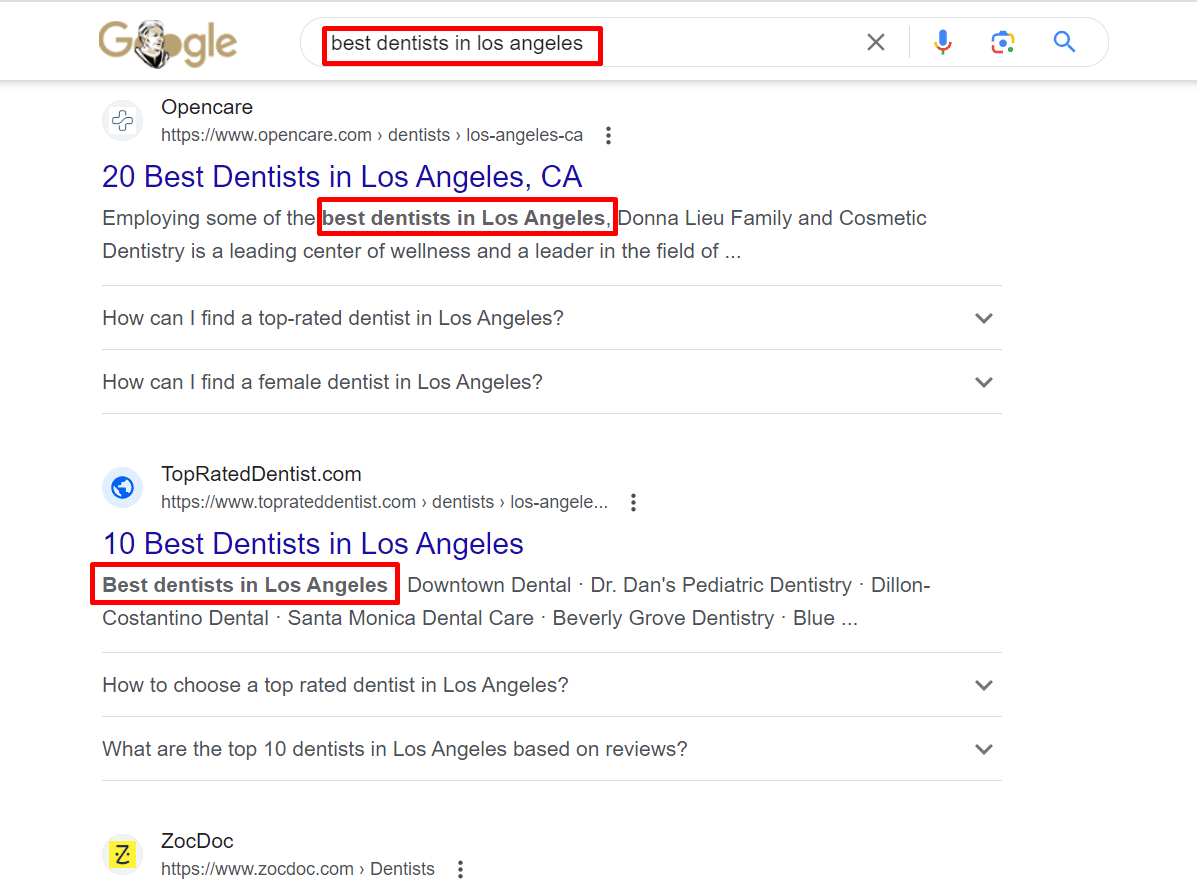
Paid search results, PPC (Pay-Per-Click) or Google ads, may also appear alongside organic results. You can bid on specific keywords such as dental checkup, teeth cleaning, teeth whitening, or oral health and pay for your website to appear in the sponsored search results when those keywords are searched.
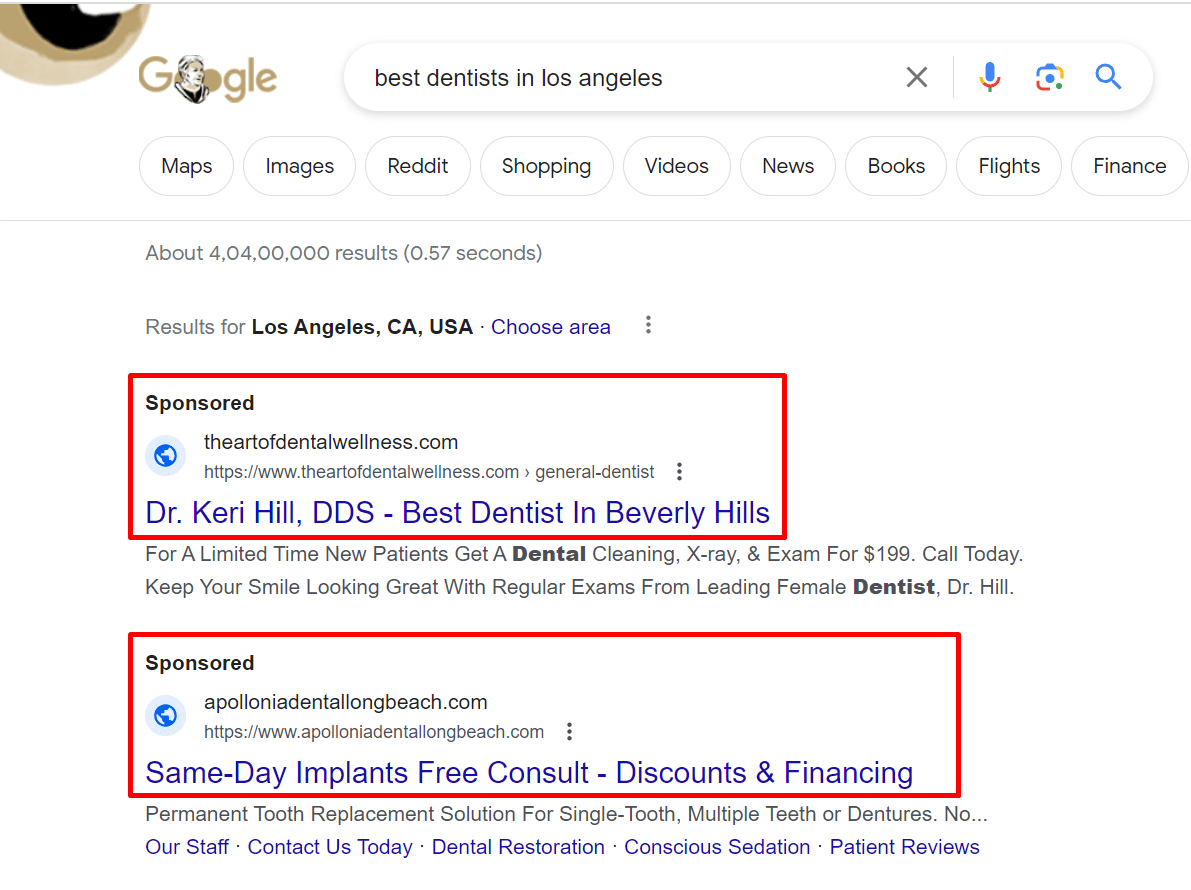
How to Do Search Engine Optimization For Your Dental Practice
While SEO may require constant effort and ongoing optimization, it can help you gain a competitive edge, enjoy sustainable growth, and make your lives easier in the long run by consistently attracting new patients.
This is how you can begin with it.
Local SEO
Local SEO helps you target your local audience and get patients in your area.

To get started with local SEO, you need to locate your local business on Google Maps and optimize your Google My Business (GMB) account. Provide accurate and consistent information about your dental practice, including contact details, opening hours, and services offered.
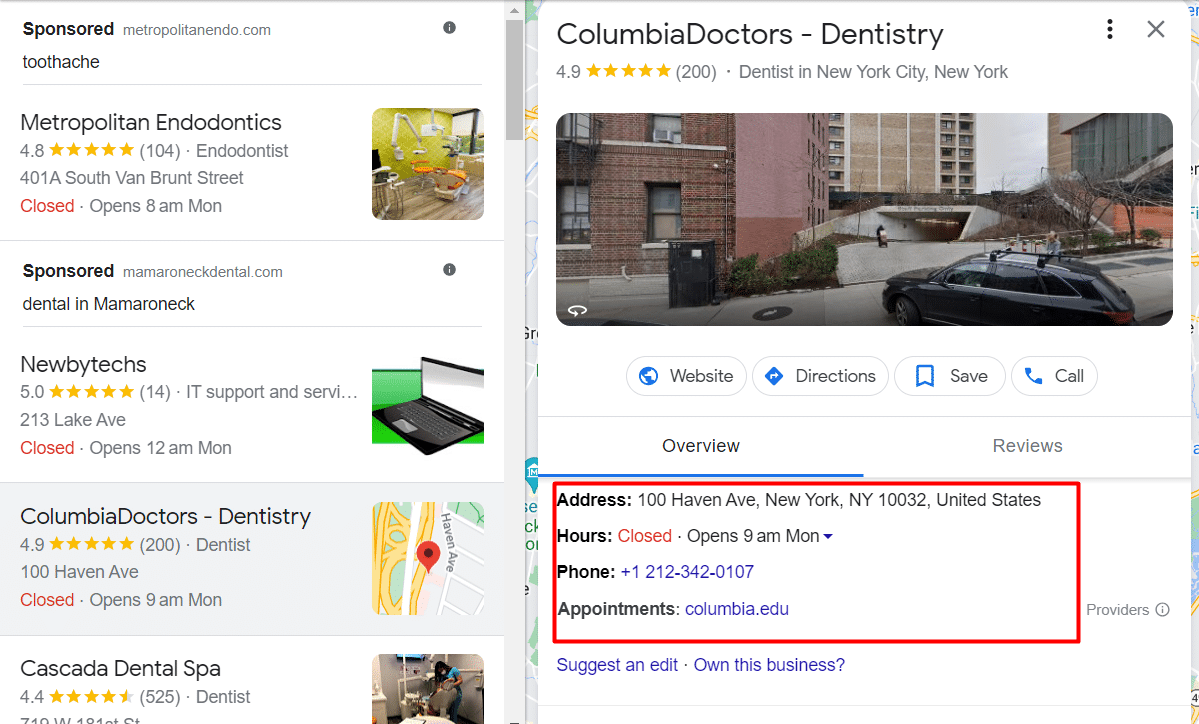
Plus, encourage patients to leave reviews on your business listing because positive reviews can improve your local ranking.
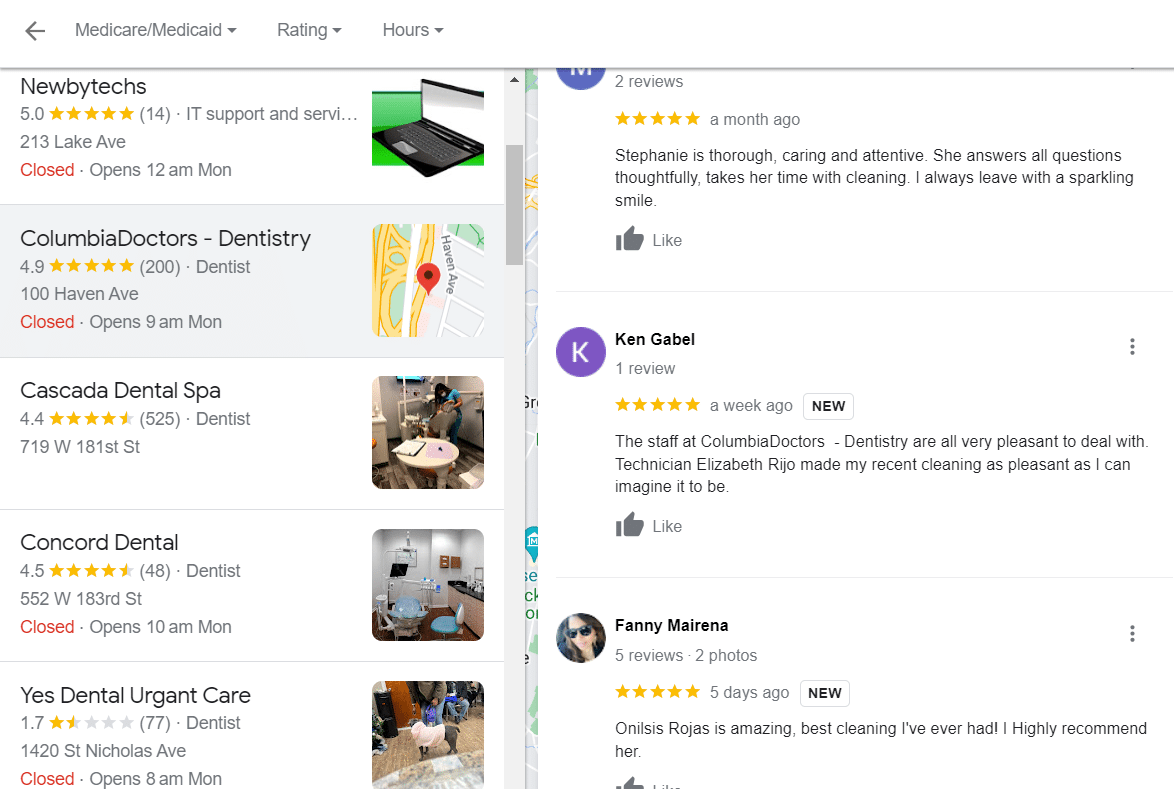
But when you’re just starting out with local SEO, you’re competing with dental clinics that have an established online presence, higher SEO rankings, and numerous reviews.
So, to outrank them, you’ll need to focus on delivering exceptional patient experiences, providing high-quality services, and actively engaging with your patients. It can encourage satisfied patients to leave reviews on your GMB listing and directories like Yelp, which can help improve your online reputation and local rankings.
Additionally, target long-tail keywords and include location-specific terms to optimize your website’s content for local searches, and be consistent in NAP (Name, Address, Phone Number) across your website, and directories.
On-Page SEO for Dentists
On-page SEO involves optimizing various elements on your website to enhance its relevance and user experience.
To get started with it, conduct comprehensive keyword research to identify relevant keywords that potential patients may use when searching for dental services—for instance, root canal specialist, root canal therapy, pulpotomy, toothache relief, cracked tooth, or more.
For example, in the screenshot below, Columbia Doctors Dentistry have created loads of content on every single service they provide, covering the keywords they want their patients to find them for.

Incorporate these keywords strategically in your website’s titles, headings, meta tags, and optimize your web content for them.
To do this, you’ll need to create informative high-quality content that addresses common dental concerns and showcases your expertise.
While on-page SEO directly contributes to search engine ranking, it can only do so much alone. Outranking established competitors requires a holistic approach with other factors like off-page SEO, technical SEO, and online reputation management.
Off-Page SEO for Dentists
Off-page SEO refers to optimization strategies that you implement outside of your website to improve your online visibility and authority. It involves activities aimed at building your website’s reputation and acquiring high-quality backlinks from other reputable websites.
To get started with it you’ll need to develop a comprehensive link-building strategy to acquire relevant and authoritative backlinks from reputable dental industry websites, local directories, and other relevant online sources.
Backlinks and content marketing go hand in hand. So, to get those high-quality backlinks, you’ll need to create valuable, informative content that establishes your expertise in the dental field. Then promote this content through various channels such as guest blogging, social media, and email marketing.
If you want to beat the competition faster, focus on creating content that surpasses existing resources and reach out to relevant websites to promote it to acquire backlinks naturally.
Technical SEO For Dentists
Technical SEO means the optimization of the technical aspects of your website—for example, optimizing for website speed, mobile-friendliness, URL structure, crawlability, and indexing.
To get started with technical SEO, you’ll need to conduct a website audit for your dental website and identify areas that need improvement.
The key optimization steps include compressing images and enabling browser caching for better loading speed, having a responsive web design to ensure your site is mobile-friendly, and creating a logical URL structure.
For example, people can easily access the Columbia Doctors Dentistry’s website on their mobile devices easily.
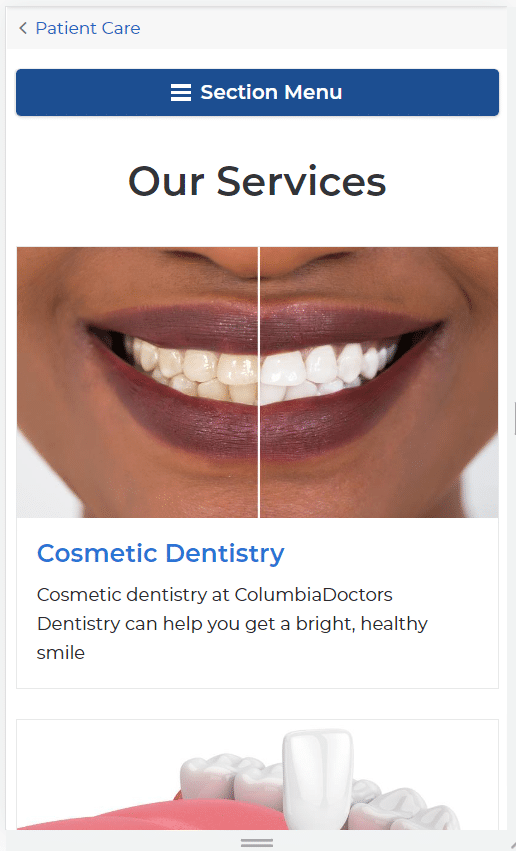
Besides that, you’ll need to generate XML sitemaps, optimize robots.txt files, and implement structured data markup to give search engines information about your web content.
Plus, you’ll need to stay updated with search engine guidelines and industry trends to maintain a technically optimized website.
To perform technical SEO activities, you can use resources like Google Search Console, website auditing tools, and online guides.
But let’s be honest here, while you can handle basic technical SEO practices, more complex aspects might require a lot of learning or assistance from web developers or SEO professionals.
Do You Need to Hire a Dental SEO Company?
It majorly depends on your goals and how much time and effort you’re willing to invest in it.
If you want your website to attract a steady stream of leads and patients, it’ll require optimizing your site for SEO, consistently improving, and staying updated with the algorithm changes.
While you can certainly attempt to handle it on your own, implementing effective SEO tactics requires a significant investment of time and a deep understanding of the ever-evolving SEO landscape.
Considering that, if you have your hands full with managing your practice and providing dental care, it’ll leave you with limited time to dedicate to SEO.
In that case, hiring an SEO company for dental practice can offload these responsibilities to professionals and marketing experts who specialize in SEO, and free up your time to focus on your core expertise. Meanwhile, giving you an influx of leads.
How Much Does Dental SEO Cost
Your dental SEO cost can vary depending on several factors, including the scope of work, the competitiveness of the market, and the SEO company or professional you choose to work with.
Different firms offer different pricing models, such as monthly retainers or project-based fees.
But the average cost for dental SEO is $1500-$5000 monthly, and if you collaborate with a consultant, then you can expect to pay anywhere between $100-$500 hourly.
You can calculate your return on investment with this formula: Gain on investment – Cost of investment/Cost of investment.
How to Find if Your Dental SEO Marketing is Working? Track Your SEO Campaign…
To know if your dental marketing SEO practices are working, you’ll need to track and monitor your SEO marketing campaign.
You can begin with determining your search engine rankings with a tool like Ubersuggest to analyze your website’s position in search results. To do this, just enter your website URL to assess its ranking for relevant keywords.
The other essential factors to measure are impressions and click-through rate (CTR). Google Search Console is a great Google tool that you can use to track the number of times your website appears in search results (impressions) and the percentage of users who click on your listing (CTR).
Plus, you need to monitor organic search traffic and engagement. You can do it with Google Analytics and track the amount of organic traffic your website receives and analyze engagement metrics such as time spent on a page, bounce rate, and conversions.
You can also consider using third-party tools like SEMrush, Ahrefs, or Ubersuggest. They provide comprehensive data on search rankings, organic traffic, and site health, making it easier to track and analyze the effectiveness of your SEO marketing efforts.
Hire Dental SEO Services Today to Scale Your Organic Leads!
Hiring dental SEO and marketing services can be a game-changer for your dental practice. An SEO agency can help you implement effective SEO strategies and stand out from competitors in search engines—all while connecting you with prospective patients actively searching for dental services.
So, invest in dental SEO services. It can yield significant long-term benefits and contribute to the success and growth of your dental practice.
At On the Map Marketing, we understand the importance of tailored approach. That’s why we offer a complementary audit to the dentists we’ve a mutual fit with to identify areas where we can help optimize your online presence. Contact us today to know more.
Table of Contents
Related Articles
Dominate Your Market with Digital Marketing Services That Deliver
Talk to a certified professional today, and we will design a strategy specific to your case.





